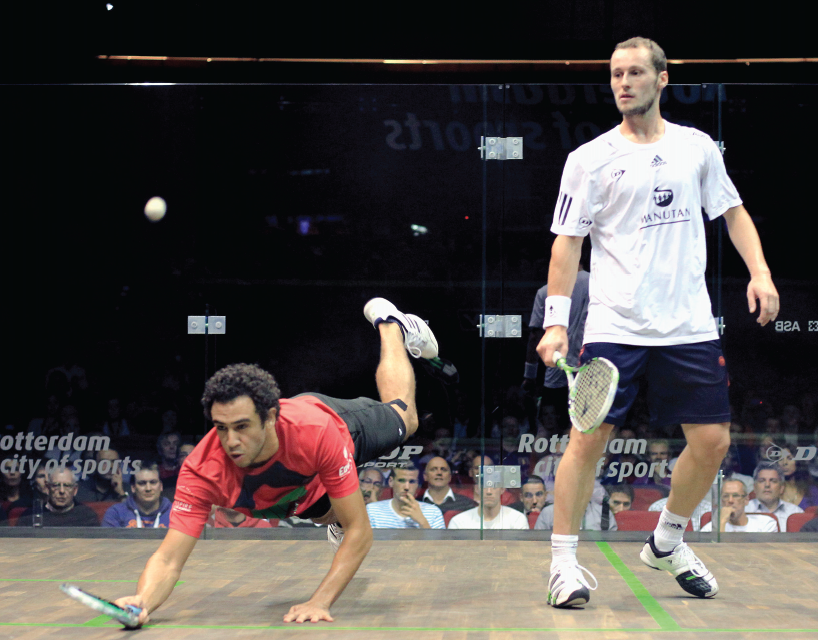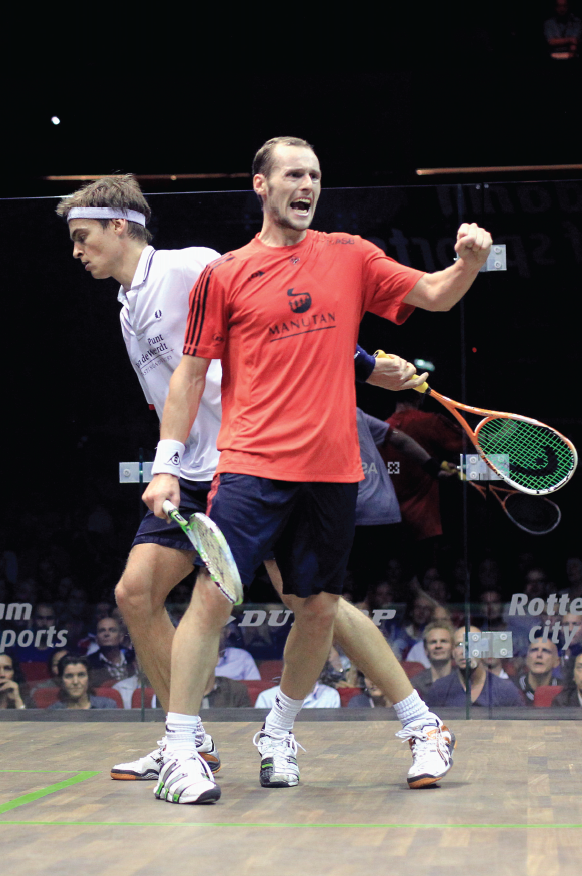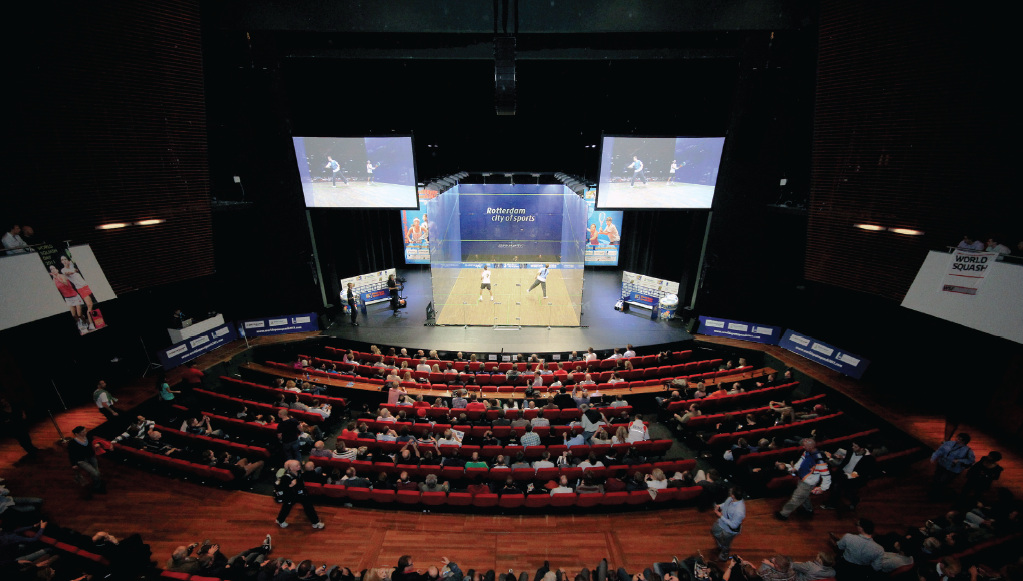
By Richard Eaton
Photos by Steve Line/Squashpics.com

Squash has never had a better sales pitch than this. The highest profile woman player of all time achieves a record sixth world title and says she would trade them all for an Olympic gold medal.
We hope Jacques Rogge is listening. An incentive for the IOC to accept new sports is high profile players who commit to the Games, he said, which is partly why golf got in.
Had he also been watching the World Open in Rotterdam he would have seen Nicol David on a ubiquitous glass court, presented in an innovative theatre, near the dramatic spires and wires of the Erasmus bridge, and amidst the bustle of the largest port in Europe.
Hopefully everyone on the IOC knows that such a court could easily have been situated within sight of Sugar Loaf Mountain, and could yet be placed near, say, the Sultan Ahmed mosque in Istanbul, or the Palacio Real de Madrid—which it has already, rather spectacularly.
That is the only venue in the last seven years where David has failed to win the World Open. The other six brought successes which, until her Olympic dream is realized, still mean more than anything.
And the sixth, which brought her most stunning performance, means most of all. That’s not only because it earned her outright a record she previously shared with Sarah Fitz-Gerald, the Australian who has been helping her do it.
It’s also that David’s performance during a 11-2, 11-5, 11-0 win over an in form Jenny Duncalf in the final was so outstandingly good, it elevated her reputation closer to those of the all-time greats.
Heresy it may be to say it, but David’s most convincing accolades have been those of the winningest woman squash player of the professional era, the best publicized, and the best loved. But the best? It’s a contentious question.
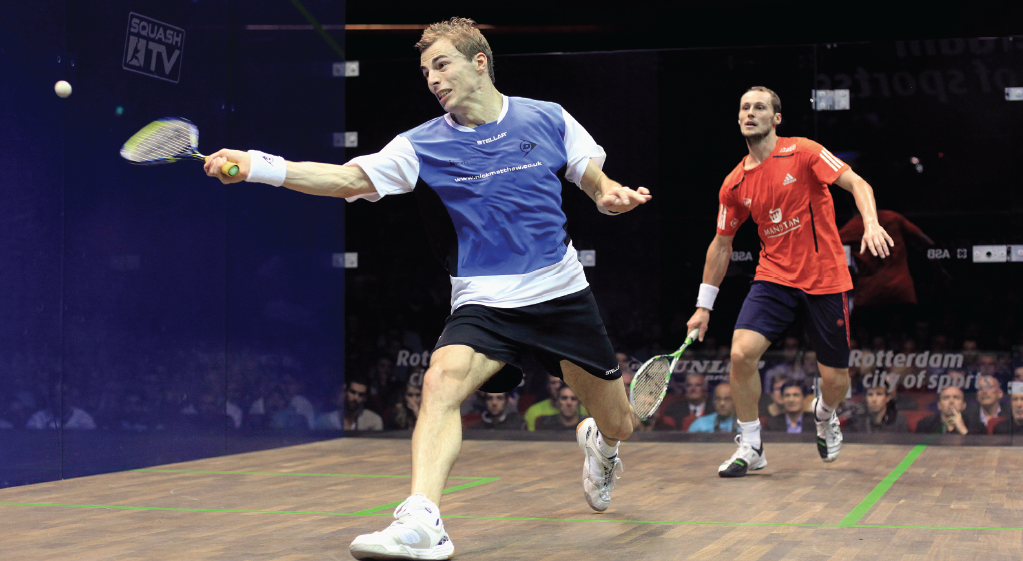
There were whispers after Fitz-Gerald’s retirement that she could still beat David in practice. Some thought Susan Devoy and Michelle Martin overcame tougher opposition than David, and were also better players. Others asserted that Heather McKay’s two decades of domination, mostly before the inception of the World Open, prove she is the best ever.
These arguments have less conviction now. David showed herself more nearly a complete player this time. So small in appearance while entering the court, she allowed so little space into which Duncalf could hit that her presence seemed huge by the finish.
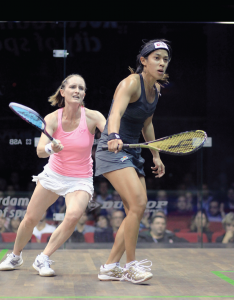
David was five points ahead before the English woman could score. She won 11 of the first 13 rallies at frightening speed, and hurtled through the third game without losing a rally.
When Duncalf tried to play herself into it by keeping the ball deep, it merely made the rallies longer before producing the same outcome.
When Duncalf played short, showing her skill with volleys, drops and angles, that brought no improvement either. David’s speed took her to everything. This time the only change was rallies with a more spectacular outcome.
A telling moment came at 7-3 in the second game. Duncalf found herself with most of the court into which to make a kill, and struck the ball almost perfectly. Almost but not quite, for the second bounce landed a few inches up the back wall, just enough to enable David to retrieve it.
The crowd gasped and Duncalf sagged slightly. She managed only two more points after that. She had done little wrong, and made few mistakes, but was overwhelmed by a champion whose abilities were coming together like never before.
The extent of David’s repertoire now became evident in the final game, especially the skill and anticipation of her volleying and the quick and perceptive touch at the front. She revealed a pleasing ability to mix the short and the long games, something she did little when she first became champion.
David had an aura too. Fear of failure, so often the monster stalking her, had been banished into the undergrowth of the mind. It was replaced by a confidence that enabled her to applaud vigorously as Duncalf was introduced to the crowd before the match.
The gesture hinted that her opponent might be needing help. She was, and she got it, but it made little difference.
“It was without doubt the best performance I have seen from Nicol,” said Liz Irving, her coach. “That was as near to perfect as you will get.”
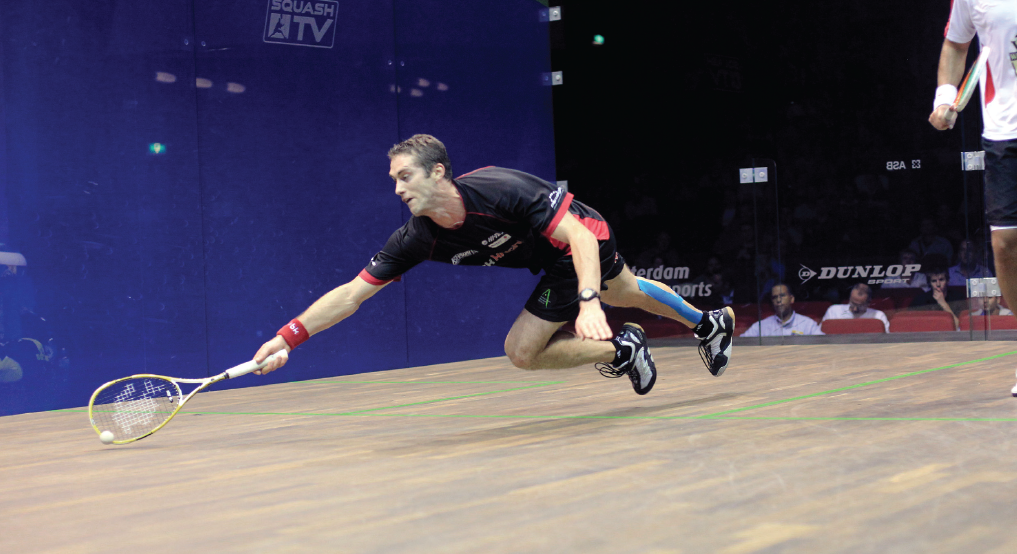
This is an ominous remark, given that David believes the record sixth is nowhere near the climax of her career. She wants to compete for another five or seven years, she says. At the age of 28 she may only be half way to her total of titles.
Is David’s opposition weaker than that of other greats? Duncalf played with skill all tournament but was eventually trampled. Massaro, twice conqueror of David during 2011 and the WISPA’s player of the year, was beaten by Duncalf.
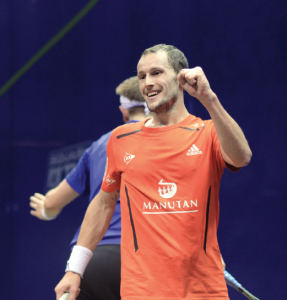
Kasey Brown, who overcame David at the US Open, looked a slimmer, quicker player than last year, but was dispatched 11-9, 11-4, 11-6, after leading 7-6 in the first game and 5-2 in the second. “I had to raise my level or she was going to take it,” David said. Raise it she did, a couple of notches at least.
Brown may be a threat in the future, as may Nour El Sherbini, who on her 16th birthday beat a seed, Donna Urquhart of Australia, the 13th. The Egyptian’s compatriot, Raneem El Weleily, aged 22, took Brown to five games, and could push into the top five.
Rachael Grinham, the 33-year-old Australian who succeeded David as world champion in Madrid, was sluggish by her extremely nimble standards and was beaten by Samantha Teran, the first Mexican to reach the semifinals.
Madeline Perry, David’s conqueror in the 2009 British Open, was overwhelmed by Natalie Grinham, who arrived wheeling a pram containing her 18-month old baby Kieran. The younger Grinham—and the pram’s contents—were the most photographed participants of all.
Natalie and her husband Tommy Berden were both among the tournament’s greatest successes. He it was who chose the Luxor’s and its modern, nautical ambience to house the World Open and he, as its organizer, who steered the enterprise with an oceanic calm. Natalie achieved its longest lasting home support, upsetting two seeds, Perry and Low Wee Wern.
The former world runner-up from Australia who now represents The Netherlands, employed her balletic steps and deftly creative game almost as well as she used to, each time returning immediately to the pram.
Close by, Berden was riding the waves. Some were quite big. The tournament suffered a power outage which left it in the dark for more than an hour during the first round matches.
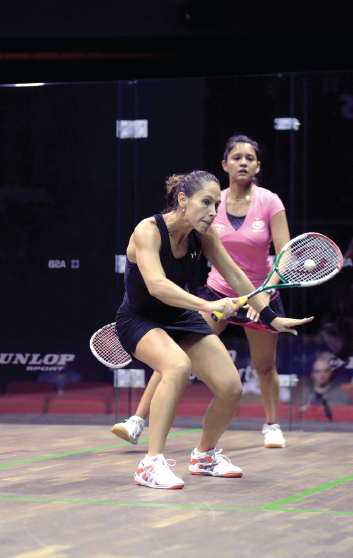
When the lights returned Davide Bianchetti perpetrated perhaps the longest tirade in the history of squash. The referee told him to be quiet, then awarded a point penalty, asked him to be quiet and then awarded a game penalty, and waited almost another minute before learning that Bianchetti’s Italian allegedly meant “you’re a clown, award the match against me,” a translation made by a non-officiating referee. He duly obliged, hastening Saurav Ghosal’s path into the second round. It was probably the last PSA Tour match of Bianchetti’s career.
Bianchetti may have had retirement in mind anyway, but referees on the PSA Tour were reportedly prepared to seek a ban from the WSF. They also wished to lobby for “professionalism and respect toward officials.”
This issue was described as important for squash’s Olympic chances nearly ten years ago by the IOC, and is reputed to have hastened the introduction of the three-referee system.
Prompt action was also needed to contain a Twitter crisis. Several players were posting controversial remarks, apparently unaware that controversial comments on social media can easily leak to an embarrassingly international readership.
It was followed by the world champion announcing his displeasure with the schedule. Nick Matthew even made a convincing case that it almost scuppered his title defense.
Players in the bottom half of the men’s draw played two rounds at a well-known sports club, the Victoria, while those in the top half, including Matthew, played three— a discrepancy apparently caused by a late date change in the World Open.
It resulted in eight players playing an extra match on hot bouncy traditional courts, which meant it was impossible to deliver the stroke-making, risk-taking squash now characteristic of the PSA Tour.
“As defending champion I think I should have had something better than that,” Matthew commented. Even more unluckily for him, that third match pitched him against Mohamed El Shorbagy, a former world junior champion now clearly playing to a top eight standard, who nearly did for him.
Shorbagy led 9-5 in the pivotal third game before Matthew carved out an exhausting 8-11, 11-5, 11-9, 5-11, 11-1 late night victory. “It was a very, very difficult match,” he said. It was the closest he came to defeat.
After that, to win three more matches, including a passionate, incident-packed final against Gregory Gaultier, who had been playing perhaps the best squash of the tournament, was an exceptional effort. The 31-year-old Englishman’s achievement in winning a second World Open, was arguably greater than winning his first.
Matthew ended Gaultier’s dream of becoming only the second Frenchman to win it by triumphing 6-11, 11-9, 11-6, 11-5 in a final of fluctuations, high emotions, and repeated controversy.
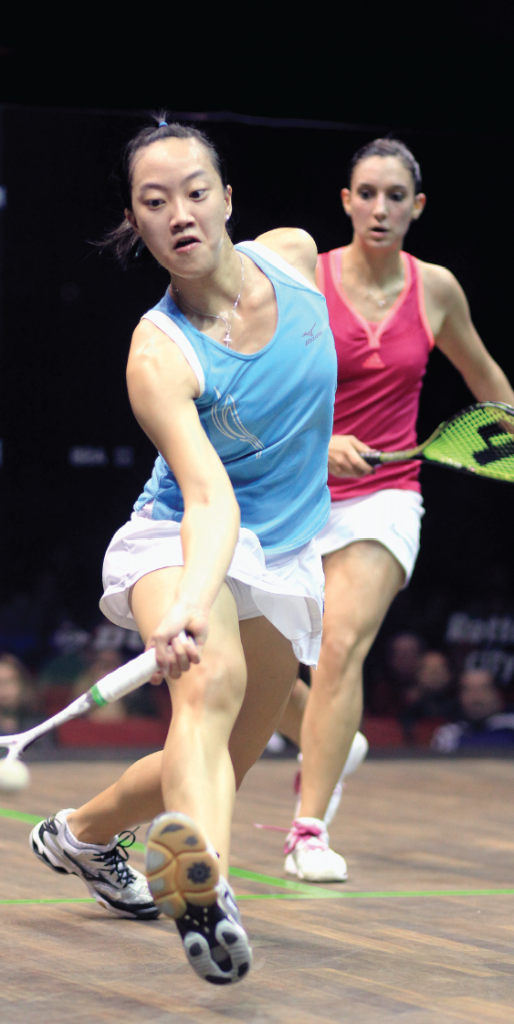
When Matthew trailed by a game and 1-3 he was slipping into trouble, for had Gaultier won the second game he would probably have had the momentum to succeed.
But, having first denied Gaultier the fizzing rallies he likes, Matthew then responded to danger with increased pace which earned him a slight lead. He painstakingly clung to it during some fiercely prolonged rallies, helped by refereeing decisions that upset Gaultier.
Some of these brought boos from the crowd, and eventually Gaultier lost his patience, blurting at the English official: “you never hesitate to give a no let against me.” That got him a code violation warning.
There were two turning points. One happened soon after this altercation. Gaultier endured two more decisions he disliked and recovered excitingly from 7-10 to 9-10—only to lose the vital second game on a penalty stroke, awarded when the referee judged the ball had passed too close to the Frenchman.
The other happened with Matthew 8-6 up in the third game. They collided, and Gaultier, who was tiring, slipped and fell, hurting an ankle. After a three-minute injury break he lost nine of the next ten points.
The fourth was mostly Matthew, who rapidly took advantage of Gaultier’s reduced mobility to the front. But it was an hour and a half before he got the better of his gifted but insecure opponent, whom many thought would win.
“I stuck in, stuck in, stuck in, and just started to attack a little bit,” Matthew said of the change he obstinately engineered in the second game. “I got a finger in the door, and then my body through, and saw a chink of light and went for it.”
He also volunteered that both of them had argued too much with the referees, and apologized, hoping no-one would hold it against them. There were Olympic echoes here too.
In fact Matthew had been magnificent—physically resilient, tactically flexible, and temperamentally both stable and passionate. “I never thought Nick would ever become world champion twice,” admitted his coach David Pearson. “I was blown away.
“There are very few players who have achieved what he’s done, when you look at how he did it. He’s as stubborn as they come and that’s been one of his biggest assets.” “At 19 and 20 he was technically so poor,” Pearson added. “It was a question as to whether he had the skills. But over a five-year period he changed his movement and the rest is history.
“I think that he’ll now pick the tournaments he really wants to win, and go from there. But there’s another title in him for sure.”
It is harder to see Gaultier, after his third loss in a World Open final, ever winning it. Once again he looked the most complete player in the world for a game and a half. And once again he became snared by the vagaries of refereeing, and the demons it revives in him.
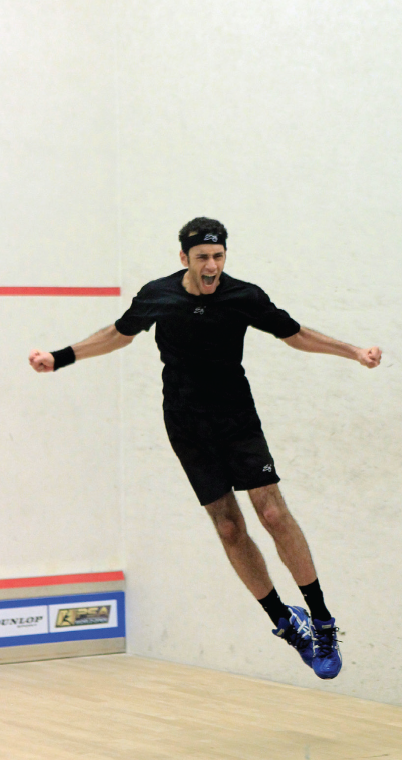
It was a surprise in some ways, for there were signs that this might be Gaultier’s time. He recovered from two games down in the last 16 to deny the Dutchman, Laurens Jan Anjema, and a thousand cheering, jeering one-eyed spectators. Then, suddenly as charming as he had been angry, Gaultier won them round.
“You guys, you stressed me out,” he told them as he came off court. “So much, that I am not pleased with you,” he added. “But maybe you will come back and cheer for me next time.” And they did.
Three other recoveries from two games down brought much drama. One came from Amr Shabana against Hisham Ashour, and two from Ramy, the younger Ashour brother.
Ramy, the PSA player of the year, was many people’s favorite for the title. But once again, his troublesome hamstrings hampered him, and for the second World Open in succession, he was forced to retire.
Against Nicolas Mueller, an improving Swiss player, and against Alister Walker, a former England international now representing Botswana, Ramy struggled on with legs alarmingly plastered in blue tape, strolling carefully through the first half hour, then somehow accelerating to victory.
But against Gaultier it came to a sudden and embarrassing halt. He gave a loud and lengthy yell, doubled up with pain, shook hands, and left abruptly, too emotional to speak. Gaultier was asked to speak to the crowd instead—but, seemingly close to tears himself, he couldn’t manage it either.
The great Shabana also looked less fit than he was. The four times former world champion was certainly not the same as when he took the US Open title in October. Now he lost in four games to another Englishman, James Willstrop, who was himself beaten in three games by an excellent Gaultier. Few would have bet on none of the Egyptians reaching the final.
Matthew had also ousted two other Egyptians, Karim Darwish, the former World No. 1, and Tarek Momen, his conqueror a fortnight earlier in Qatar, and was a little tearful when asked for his feelings about his successful defense.
So too was Shabana after his quarterfinal loss, perhaps sensing he may never win the title again. And so too was David Palmer after being asked to a take walk of honor around the theater in celebration of his retirement. It brought a prolonged standing ovation. Tough guys weep occasionally as well.
Twice world champion, Palmer has arguably been Australia’s most influential player since Rodney Martin 20 years ago, and certainly its most successful since Geoff Hunt 30 years ago.
He will remain in Orlando where he plans to open a squash academy, and will still compete a little—on the Pro Squash Tour in the US, and perhaps some hardball doubles.
Palmer’s farewell was possibly the best ever given a squash player, and his epic five-game third round win over his fellow 35-year-old, Thierry Lincou, provided the best memory of his last PSA tournament.
“It doesn’t matter that I lost,” the Frenchman said gallantly. “I could feel the joy. It was a special match, very meaningful. It’s his last World Open, and one of my last too. There was a special feeling out there.”
